How I Saved Loads of Money Teaching English in Taiwan
Disclosure: Where in the World is Nina is a participant in the Amazon Services LLC Associates Program, MileValue, as well as other affiliate programs, designed to provide a means for us to earn fees by linking to Amazon and affiliated sites at no extra cost to you. Please see my Disclosure for more details.
This guide for becoming an English teacher in Taiwan is authored by Nick.
Before I decided to become an English teacher in Taiwan, I was a travel addict. I actually thought I was going to be a backpacker for the rest of my life. In 2008, I showed up in Taiwan. Ten years passed, and I was still there.
So, why exactly did I get stuck in Taiwan? The short answer is that I fell in love with the country. The long answer is so complex that I wrote an entire book about it. But, suffice to say that marrying a local, moving in with her family, having two kids, making great money as a teacher, launching a career as a successful blogger & writer, and never getting bored of all the things to do in Taiwan all played a role.
After my eleventh year, my wife and I finally decided to leave Taiwan, with our two young kids in tow, and move to my hometown in Canada. The reasons were as complex as those which caused me to stay in Taiwan for so long.
In this article, I’m going to tell you how my wife and I saved nearly half a million Canadian dollars as English teachers in Taiwan (spoiler: we worked really, really hard for a long time), enough to buy a family home in Canada in cash. But before I reveal all of our secrets, I’m going to tell you everything you could possibly need to know about how to become an English teacher in Taiwan.
Don’t lose this! Click to pin it now.
Mục Lục
Things to Know About Teaching English in Taiwan
There is a lot I wish I had known about being an English teacher in Taiwan before I arrived. It would have helped me mentally prepare what I was signing up for, come at a better time of year, and ultimately, make more money.
Why Is Taiwan a Great Place to Teach English?
Taiwan is a comfortable place to live in. It is one of the safest countries in the world, has public health care, a super convenient transportation system, delicious food, and the locals are very polite and hospitable to foreigners.

A good break from teaching in Taiwan is to go hiking.
Most people in Taiwan speak a little bit of English. For anyone who loves music, sports, or outdoor activities such as hiking, surfing, or swimming, you will never be bored.
For all these reasons, Taipei City has been rated the number 1 city for ex-pats in the world for two years running.
What’s It Like Teaching in Taiwan?
Of course, jobs are going to vary, but the majority of foreign English teachers in Taiwan work either in kindergartens or after-hours cram schools. A lot of them also take on private tutoring jobs to supplement their working hours.
Most of these teachers work with very young and elementary-aged students. It is far less common to teach at the junior high, senior high, or post-secondary level, especially for new teachers in Taiwan, and the same thing goes for public schools. For most of these roles, local teachers are preferred and positions for foreign teachers are scarce. When they are available, they tend to require higher qualifications and experience.
Teaching young children, you will be expected to teach them the basics of English conversation, reading, and writing, doing a combination of book work, games, and classroom activities. As a cram school teacher, you will be supplementing English lessons they already receive in their regular schools, and most students will already be able to use the language to a varying degree.

Being an English teacher in Taiwan is fun as you can see.
Some teachers teach alone and will need to handle classroom disciplinary issues, but some schools (especially at the younger levels) provide a local TA (teacher’s assistant) to help out with such things.
One occasional complaint from teachers in Taiwan is that they kind of feel like a “clown” hired to entertain the kids, dress up as Santa at Christmas, and be a white face to slap on the school’s promotional materials. Another complaint is that a lot of time may be wasted in cram schools doing things not focused on the children’s education, for example practicing elaborate dance routines for performances meant to impress parents.
These are just part of the job in Taiwan, and for teachers who are better at just “going with the flow” and doing what the school wants them to, they will probably have a better experience working in Taiwan and maintain a good working relationship with their boss.
Like most teachers, I started working out in kindergartens and cram schools at the elementary age. As the years passed, I taught fewer children, and more teenagers & adults. I came to specialize in teaching business English to adults working for computer and technology companies.
What Are the Working Hours Like?
In order to maintain an ARC (see more on that below), you will need to work a minimum of 14 teaching hours per week.
Many kindergartens hire teachers to work only mornings, while cram schools often only provide a few hours per day in the evening. Therefore, it’s quite common for teachers to work at two or more different schools to get enough working hours. An example of this kind of work routine would be working 9 AM to noon at a kindergarten, taking a break, then working 4:30 to 8:00 PM at a cram school.
Some schools hire full-time teachers and pay by the month. If considering a job like this, it’s important to calculate how much they are paying you relative to the hours you will need to work to determine if it’s a good rate. And don’t forget to factor in all those hours you may be expected to spend there between classes attending meetings, picking up kids from their regular school, and so on. While full-time jobs can work, I personally always preferred to work for multiple schools by the hour.

Teaching in Taiwan is a rewarding experience.
Most English teachers I knew in Taiwan worked 20-30 teaching hours per week. Those that worked 30 or more per week made the most money but were also the most exhausted. You must consider that you are paid by the teaching hour, but not paid for the time between classes, planning your lessons, or traveling between schools. Therefore, 30 teaching hours might equate to 50 or more hours per week when you add up everything else.
Saturday is a big day for cram schools in Taiwan, so a lot of English teachers agree to work on Saturdays, while others prefer to keep their weekends open for leisure activities and avoid working at schools that have Saturday classes.
What Qualifications Do I Need to Be an English Teacher in Taiwan?
At the bare minimum, you legally need the following:
- A four-year Bachelor’s degree in any field. Having a degree in education is a plus, but rarely a requirement.
- Since 2017, a criminal record check from your home country is required, and it cannot be more than six months old. It’s important to note that these can take up to 10 weeks to apply for in some countries.
- Not a legal requirement, but you will also need to come from what they consider to be an English speaking country (UK, USA, Canada, South Africa, Australia, or New Zealand). If you’re an English speaker from, for example, the Philippines, India, or Europe, you may have a lot of trouble finding a decent English teaching job in Taiwan. I’ve personally noticed that English teachers from these countries have better luck finding jobs in China or Southeast Asia.
Other things that aren’t necessary but may help include:
- Any teaching experience
- A TEFL certificate or similar teaching certification
- A fun personality
- A recommendation from a current teacher in a school
There are a few unpleasant tendencies in the hiring process that can’t be ignored. First of all, private schools in Taiwan (including most kindergartens and cram schools) are run as businesses, and they often prioritize appearances over the actual education of the students. Generally speaking (there are exceptions of course), they prefer to hire young teachers. The majority of foreign English teachers in Taiwan are in their 20s and 30s.
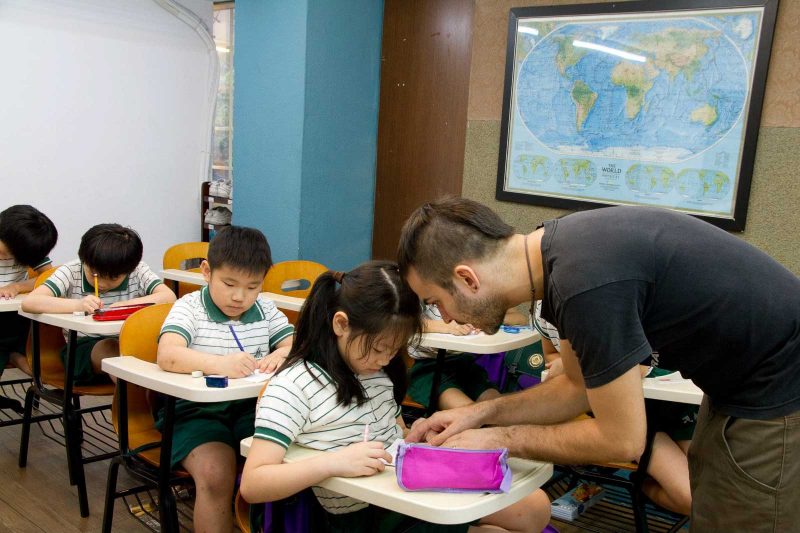
This is what being an English teacher in Taiwan looks like.
Second, Taiwanese parents can be racist. They think that a “real” native English speaker or American somehow equates to being white. Therefore, people of different shades, including ABCs (American born Chinese/Taiwanese), may encounter more difficulty finding teaching jobs in Taiwan or be offered less pay for the same job, even though they are native English speakers from English speaking countries. This is something that is changing, slowly.
Last, although male teachers aren’t necessarily preferred in schools, the numbers show that male foreign English teachers are more likely to stay longer in Taiwan, and there are more of them than female ones.
How Do I Get a Visa to Teach in Taiwan?
Most English teachers in Taiwan get an ARC (Alien Resident Card), which includes a work permit. The first school you get a job at will apply for this on your behalf, and after that, you will have to stay at that school to maintain your work permit.
If you were to walk out on that school, they would likely cancel your ARC and you would have to leave Taiwan or find a new job ASAP. If you want to transfer to a different school before your year is up, you will have to ask your boss to transfer your ARC to that new school, so it’s important to be on good terms with your school otherwise they won’t want to do this for you.
To get the ARC, you will need to submit all your documents (passport, degree, criminal check), pay a fee, and complete a health check in Taiwan. You will need to at least start this process before you visitor’s visa (or visa-free period, which is 90 days for Canadians and Americans) expires. This should be more than enough time to find a job.
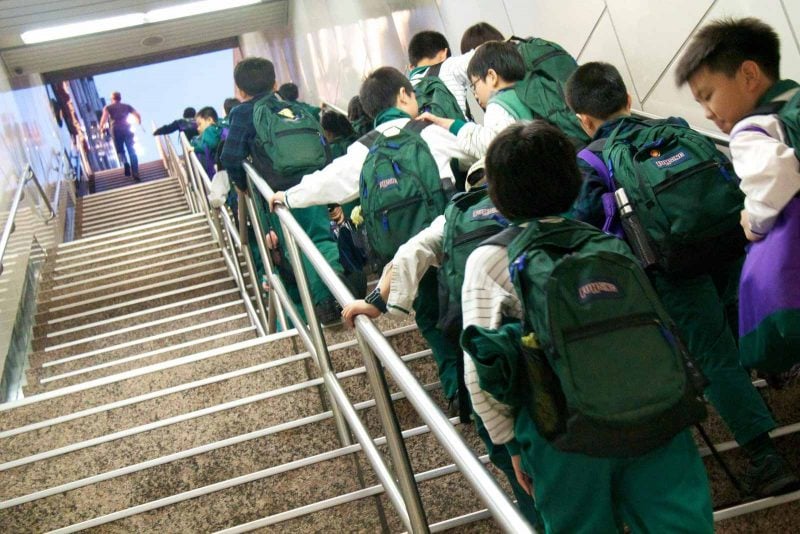
Students walking to school.
Once you get your ARC, this serves as your local ID card, and you will be able to apply for the national health care program. With this, you get free health care and medicine (you have to pay TWD 150, or $5 per doctor’s visit, including any medicine prescribed). It is also possible to get an ARC in Taiwan through marriage to a local.
If you hold an ARC for 5 continuous years, you can apply for an APRC (permanent alien resident card), which lasts forever, and you will no longer be tied to any school. With an APRC, you could get any kind of job you wanted to in Taiwan, for example, working for publishers (as I eventually did) or even opening a bar or restaurant.
Getting full citizenship is almost impossible in Taiwan. Basically, you would have to give up your own country’s citizenship, which few want to do. Sadly, this means you can never vote or have full citizenship rights in Taiwan, even if (like me), you get married, have a family, live there for a decade, pay taxes, etc. Luckily, my kids (who were born in Taiwan) automatically got dual Canadian and Taiwanese citizenship, though.
How Do I Find an English Teaching Job in Taiwan?
There are two main routes you’ll have here: finding a job before you arrive, or showing up in Taiwan and then finding a job. Both have upsides and downsides.
Getting a Job First
If you arrange a job online before you arrive, you will have peace of mind and can start working (and making money) right after you arrive. On the downside, you won’t get to see the school or meet the boss that you will be working for.
Sometimes crappier schools offering crappier pay resort to hiring teachers from abroad. The teachers have no idea what they are getting themselves into. Often those schools hire agents to do the hiring for them, and the agents may even get a cut, so you may get paid less than you should. Another common scenario is that those schools are located in crappy industrial areas or suburbs that are not very desirable to live in, so they find it easier to hire teachers from abroad who don’t realize such things.
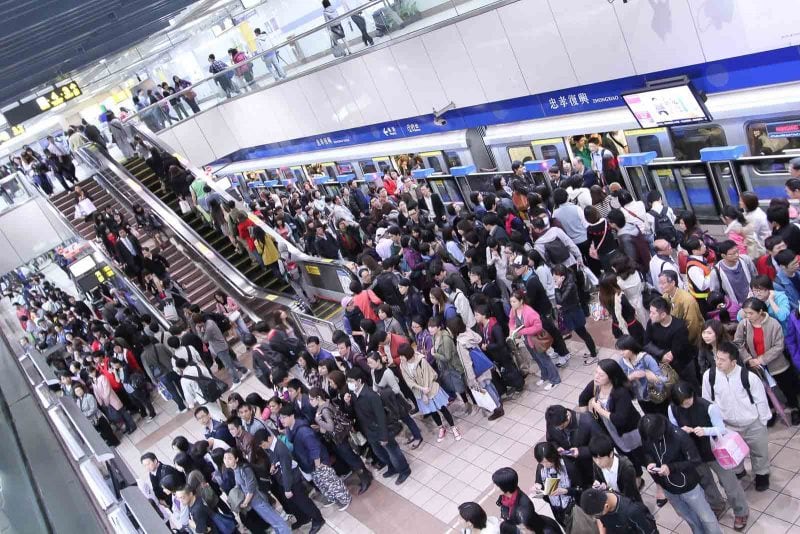
A part of being an English teacher in Taiwan involves taking crowded metros to work.
Therefore, if you plan to get a job before you arrive, make sure you check the contract, wage, and school location carefully first to make sure you are OK with it. If you’re looking at Taipei City or New Taipei City, you’ll want to be near an MRT station, for convenience’s sake.
Getting a Job Once Your in Taiwan
The second choice is to just show up in Taiwan then look for a job. This way you can be pickier, interview at several places, and see the school before you sign up. You will also have more time to meet people, understand how things work, and shop around for a better job.
On the downside, though, you will need to have enough money to support yourself until you find a job and get your first paycheck, which could come over a month after you actually start working. Also, you run a higher risk of not finding anything for a while and burning through your savings.
I’ve never heard of anyone showing up and not finding a job eventually (provided they meet the basic qualifications). Most people find something within a few weeks to a month. But at some busier/more competitive times, I’ve had friends who took nearly two months to find a job (this is rare). Some schools will ask you to do a teaching demo as a part of the interview, and some won’t.
So how do you go about finding job vacancies? Tealit.com is the go-to website for job postings, while numerous Facebook groups are devoted to seeking and sharing English teaching jobs in Taiwan.
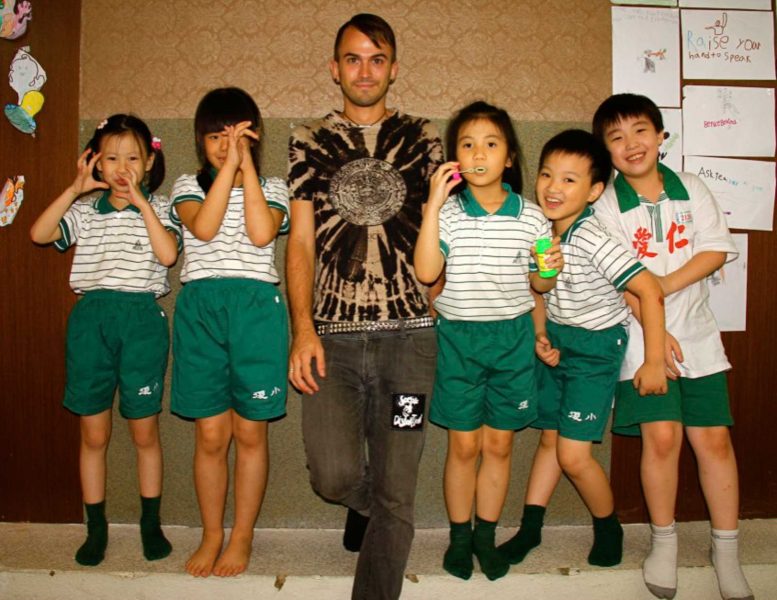
It’s an amazing feeling when you find the perfect job for teaching in Taiwan.
Once you’re physically in Taiwan and spend some time there, you will get random jobs thrown at you all the time. As an English speaker, everyone from your hairstylist to random passersby on the street will want you to teach them or their kids.
I’ve even been asked to be a talk show participant, voice actor, video producer, and model, just to name a few of the random jobs I’ve been given in Taiwan, despite having no experience or qualifications in any of those areas. Sometimes companies in Taiwan (including schools) just want a foreign face to slap onto their product or service.
Besides that, you’ll network with other teachers, who are often asked by their schools to recruit their teacher friends. There are also subbing opportunities and entire Facebook groups for finding subbing jobs, not to mention many more general information groups for foreigners living in Taiwan.
What Kind of People Become English Teachers in Taiwan?
This is a tricky question to answer because there are a lot of associated stereotypes, but here are some of the most common stories I heard from other teachers in Taiwan about why they decided to come:
- People who graduate with a Bachelor’s degree but still have no idea what they want to do
- People who want to see a different part of the world before starting their career
- People who want to travel, but make some money at the same time
- People who are interested in learning Mandarin and having a cultural experience
- People who want to save money to pay off student loans
- People who are dissatisfied with the lifestyle in their home county
- People who are saddened by a recent breakup and want a radical change (a lot of people I met cited this reason!)
- People who want to make a career of teaching internationally (usually aiming to move up to an international school and then be able to work anywhere in the world)
- People who are attracted by Taiwan’s unique culture & environment
Of course, there are many more reasons, but these are just a few common ones I encountered.
How Much Money Will I Make Teaching English in Taiwan?
The numbers vary a lot according to where you are in Taiwan, how much you make by the hour (or month), and how many hours you work per month.
Generally speaking, teachers in the capital, Taipei make more but have a higher cost of living.
The average starting wage in a kindergarten or cram school in Taipei is TWD 600-700 ($20-23) per hour, and the average monthly wage is TWD60,000-70,000 ($2000-2300). These are just averages, and I knew people who made more or less. It’s pretty normal for teachers in smaller towns to make less (for example, TWD50,000 per month) but they also have cheaper rent and way fewer opportunities to spend their money, so they can actually save the same amount or even more.
The more years you spend in Taiwan, the more likely you are to earn a higher income, as you get raises, move up to better jobs, and find private tutoring jobs to supplement your income.
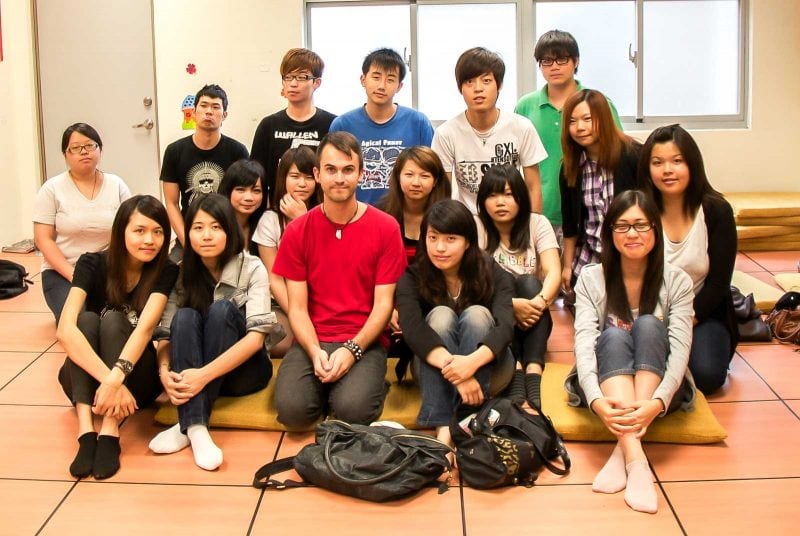
I was an English teacher in Taiwan for college kids also.
In my 10 years in Taiwan, the highest wage I ever had in a cram school was TWD850/hour, while I made $1200/hour teaching in a college. Most of my friends who had been there for multiple years made around TWD 80-90k per month. Some of them had moved up to managerial roles in schools, while others had gotten hired by better schools. A few of them even worked for the British Council’s English school, which offered them the chance to move to any other British council in the world.
I regularly had months in which I made over 120k (4000 USD), but this was from a combination of teaching and doing freelance writing for textbook publishers. This is not even counting the money I made from blogging after my travel blog became successful in my last year that I spend in Taiwan.
My wife made a similar wage to me, which is a little rare for a local teacher. Many local teachers in Taiwan make less money than foreign ones, but my wife did very well because she moved her way up to better roles over many years, and eventually opened her own school. We also worked more hours per week and were more devoted to our jobs than most other people we knew.
What Is the Cost of Living in Taiwan?
The amount that one spends getting by in Taiwan can vary just as much as teachers’ earnings do.
First of all, it’s important to note that you shouldn’t show up in Taiwan broke. You’ll need at least a few thousand dollars in the bank to get started (I would recommend 2-3000 USD). This will cover fees for visas, health checks, and so on, deposit on an apartment rental (often equivalent to 2-3 months of rent), and your first few months of living expenses before getting your first paycheck.
Once you get past those first few months, break-even, then start earning I think it’s reasonable to say that a teacher earning an average wage can save about half of it (around $1000 per month) if he or she tries.
However, there are many ways people can spend everything they make, including eating out a lot (restaurants in Taipei range from really cheap to really expensive), partying a lot, and traveling a lot. I have some friends who have taught English in Taiwan for many years and haven’t saved a dime.
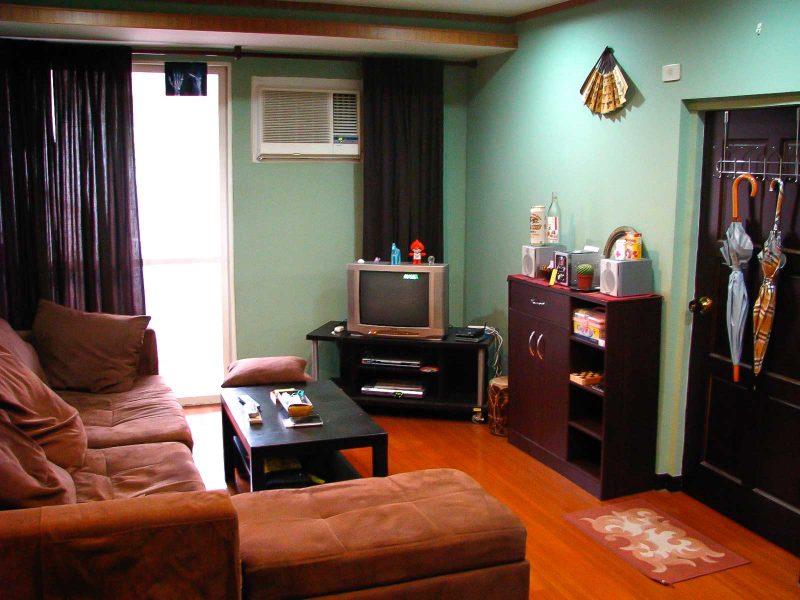
My apartment while teaching in Taiwan.
For an apartment in Taipei City, you can expect to pay TWD8000 ($270) for a tiny suite or up to 20,000 ($770) for a larger apartment. You can easily cut that amount in half by sharing an apartment with other teachers, living outside of the city center (try New Taipei City, the city that surrounds Taipei City), or living in a smaller city or town.
Items such as groceries, street food, clothing, medicine, and transportation are cheaper in Taiwan than in Western countries, but not as dirt cheap as in some Asian countries. Certain items, such as electronics or vehicles, are a similar price or even more expensive than in Western countries.
How Long Will I Need to Sign on For?
The standard teaching contract in Taiwan is for one year. It only makes sense, as schools don’t want to be constantly changing teachers, which looks bad and is not good for the students. You can also use online resources to find an apartment rental in Taiwan with an English contract; there are usually monthly and annual contracts available.
While one year may seem like a serious commitment (it seemed scary to me to sign on for that long), by the end of your first year, you may feel like you are just getting started. Finally, you understand how things work, you’re getting better at your job, you’ve made friends, you can speak a bit of the language, and you’re finally starting to save some money.

When teaching in Taiwan, make sure to take advantage of all the great things to do in Taipei like this night market.
For these reasons, it’s really common for English teachers to come thinking they will only stay for one year, but they end up staying for 2, 3, 11 (like I did), or even for life!
When Is the Best Time to Start Teaching in Taiwan?
This is a really important question and one I wish I had known the answer to before I arrived in Taiwan.
Taiwan has an annoying tax law that goes like this: If you are in Taiwan for less than 183 days in a CALENDAR year, you will have to pay a flat tax rate of 18% for all your income that year, with no deductibles.
So consider this scenario: you show up in Taiwan on August 15, 2020, to start teaching at a school on September 1. That means you will be in Taiwan for 137 days in 2020, which is less than 183. So for all the money you make from September to December, you will lose 18% of it to taxes. This could add up to thousands of dollars.
The same thing goes for the next year. If you work January to June, then leave Taiwan on the 182nd day of 2021, missing the 183-day cutoff date by one day, you would have to pay 18% on all that income again.
It doesn’t even matter when you start or finish the job. All that matters is days that you are physically in Taiwan, and if you leave Taiwan sometime in the middle for a 2-week holiday, they will deduct those days from your total.

Being an English teacher in Taiwan meant immersing myself in local activities.
Once you pass 183 days of being physically in Taiwan in a calendar year, you will only have to pay around 5%, and there will even be some deductions. You may pay almost nothing.
Therefore, it’s super important to make sure you are in Taiwan for more than 183 days per calendar year, and if you plan to leave the country for any holidays, make sure to factor that in.
Timing and Paychecks
While there may be more jobs available starting at the beginning of September (or possibly after Lunar New Year), it is possible to find new teaching jobs throughout the year in Taiwan. Even summer has lots of cram school classes and summer camps going on. But for the sake of not being over-taxed, I would suggest arriving in Taiwan anytime before July 1, or come at the end of the calendar year and start working in the new year.
Also note that even though you plan to spend more than 183 days in Taiwan in a calendar year, your school doesn’t know that for sure. To protect themselves (because they would have to pay your taxes if you disappeared), many schools will “withhold” 18% of all your paychecks.
At the end of the year, after you get your taxes done, they will give it back to you. Some schools don’t do that but will expect you to be aware of the tax rule and pay the 18% out of your own pocket when tax time comes around if you have to.
When you leave Taiwan, you legally are supposed to entrust someone else to file your taxes for you the following year, since you won’t be in the country to do it.
Which City in Taiwan Should I Teach In?
Choosing the right city in Taiwan is going to have a big impact on your lifestyle in Taiwan. Here’s a general description of the most common options:
– Taipei City: Choose Taiwan’s capital for the best attractions, most international scene, the best variety of food, best bar/club scene, events, and convenience for traveling. It has the most jobs, but the highest cost of living.
– New Taipei City: This is the largest city in Taiwan by population, and it surrounds Taipei City. Essentially it is the suburbs of Taipei City, and Taipei + New Taipei make up a city of 7 million people. The Taipei MRT extends into many parts of New Taipei city, so it’s easy to get into the city center. Basically you can find cheaper rent but still have access to Taipei City. There are loads of cram schools in New Taipei City as well.

Taipei is a beautiful city for teaching in Taiwan.
– Kaohsiung: Taiwan’s second-largest city, at the southern end of Taiwan, offers a more laid back/less pretentious vibe than the capital, seaside location, and more tropical weather, but the air can be more polluted.
-Taichung: The largest city in central Taiwan has cool art and food scene but lacks the metro system that Taipei and Kaohsiung have, so you may want to get a scooter for getting around.
– Off-the-beaten-track: If you’d rather steer clear of touristy places, have a super local experience, or be one of the only foreign faces in town, try anywhere in Yilan, Hsinchu, Miaoli, Changhua, Yunlin, Chiayi, Nantou, Pingtung, Hualien, or Taitung counties.
We Made Enough Money Teaching English in Taiwan to Buy a House
So, now it’s time for me to share my juiciest secrets: how my wife and I made enough money from teaching English in Taiwan to buy our ideal family home (and car!) in Canada, in cash.
Throughout the article, I’ve already alluded to ways that you can make (or save) more money while teaching English in Taiwan. Here are some of the strategies we adopted.
- Both my wife and I consistently taught more than 30 teaching hours per week. Basically we were both workaholics and were often very tired, especially after we had two kids and both kept our jobs.
- We lived in New Taipei City and commuted to Taipei City for work & pleasure, which saved us loads of money on rent.
- We mostly ate street food instead of going to fancier restaurants.
- We maintained a frugal lifestyle and didn’t buy lots of crap.
- I published a book in 2011. It didn’t earn much money, but having it on my resume opened up all kinds of doors to better-paying jobs after that.
- After several years of teaching for schools, my wife and I started our own cram school in Taipei City. Basically all of our private students came to us instead of us going to their homes, maximizing our teaching time.
- In later years, my wife moved many of her classes online, further reducing costs and time wasted on the road
- I got into freelance writing and editing for local textbook publishers instead of teaching, so I mostly worked from home, at an hourly rate higher than teaching.
- We always said “yes” to any job we were offered, and this happened a lot.
- When our workload became too high, we outsourced work to friends and acquaintances.
- Even after we left Taiwan, we kept some of our online teaching and writing jobs from Taiwan, so we are still making money “teaching English in Taiwan” even though we are not even in Taiwan 🙂
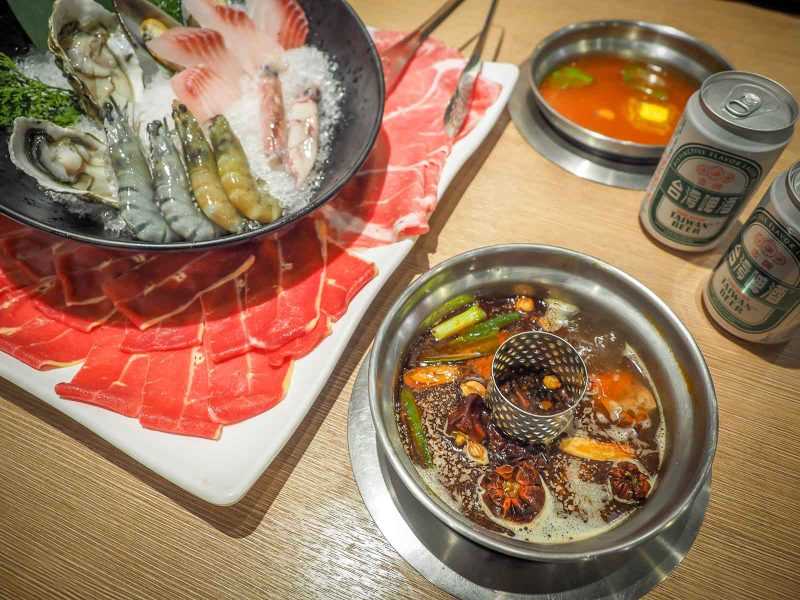
Teaching in Taiwan means lots of opportunities to eat delicious food.
Last but not least, and rather ironically, my Taiwan travel blog became quite successful in my last year in Taiwan. I had decided to turn my hobby into a profession because I had no idea what kind of job I would find after I left Taiwan and moved to Canada. So for my last year in Taiwan, I spent every free moment I had working on my site (and as a working parent/stay-at-home dad, this often meant sacrificing sleep at night).
In the end, it went even better than I could have hoped for, and now that I am living in Canada, I am still writing about Taiwan. I’ll be traveling back there regularly to maintain my site, and of course to visit friends and family.
I hope that all the information I’ve provided above, and my little “success story” has inspired you to at least consider teaching English in Taiwan if you weren’t already! Let us know in the comments below if you’ve taught English abroad.
>>> Bio
Nick Kembel is the author of Taiwan in the Eyes of a Foreigner and has contributed to CNN, National Geographic Traveller Food, Travel in Taiwan magazine, and more. He currently blogs full-time at Spiritual Travels.
Don’t lose this! Click to pin it now.















![Toni Kroos là ai? [ sự thật về tiểu sử đầy đủ Toni Kroos ]](https://evbn.org/wp-content/uploads/New-Project-6635-1671934592.jpg)


